You may also like:
The 2026 BMW M2 continues as BMW’s most compact M car with minimal changes to the base model, but introduces an exciting new flagship variant: the M2 CS (Competition Sport). The base M2 delivers 473 horsepower from its S58 twin-turbo inline-six for $68,200, while the limited-production M2 CS cranks out 523 horsepower and sheds nearly 100 pounds for $98,600[1][2]. With fewer than 2,000 CS units planned annually and an automatic-only transmission, this hardcore variant targets track enthusiasts willing to pay a $30,000+ premium for ultimate M2 performance.
According to Autvex automotive experts, the M2 CS represents BMW M’s most extreme compact sports coupe, building on lessons learned from the previous F87 M2 CS while incorporating next-generation performance technology. Understanding how long it takes to buy a car becomes particularly relevant for limited-production models like the CS, where dealer allocation and waitlists create purchase complexity.
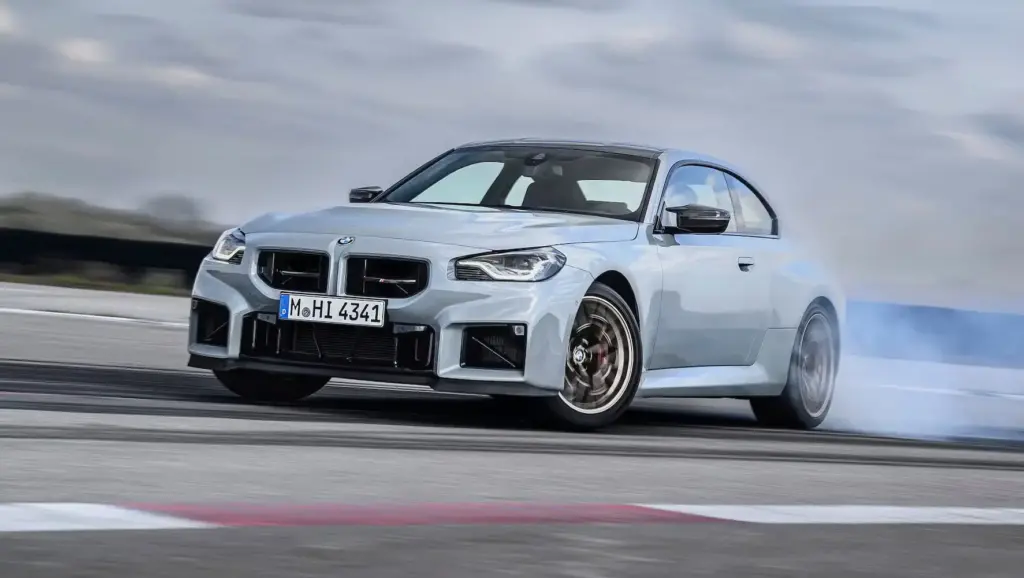
What’s New for the 2026 BMW M2
Base M2 Updates and Carryover Features
The 2026 base M2 represents evolution rather than revolution, maintaining the proven formula that made the G87 generation successful since its 2023 introduction[1].
Carryover elements for 2026:
- S58 engine: 3.0L twin-turbo inline-six producing 473 hp unchanged
- Manual transmission: Continued availability of 6-speed manual (rare in modern M cars)
- Rear-wheel drive: Traditional RWD layout maintaining M2 character
- Pricing stability: $68,200 (manual) to $69,375 (automatic) MSRP
- Core features: 19-inch M wheels, M Sport seats, iDrive 8 infotainment
The base M2’s modest price increase from 2025’s $65,500 reflects general market inflation rather than substantial equipment changes. This continuity benefits buyers seeking proven performance without first-year model year risks[1].
Introduction of the 2026 M2 CS (Competition Sport)
The M2 CS debuts as the pinnacle M2 variant, following BMW M’s tradition of limited-production CS models that push performance boundaries[1][2].
CS defining characteristics:
- Production volume: Fewer than 2,000 units annually worldwide
- Power increase: 523 hp and 479 lb-ft (50 hp gain over base)
- Weight reduction: Nearly 100 lbs lighter through carbon fiber
- Transmission: 8-speed automatic only (no manual option)
- Premium pricing: $98,600 starting MSRP ($30,400 over base M2)
BMW hasn’t disclosed exact production allocation by market, though the previous F87 M2 CS saw 621 of 2,381 total units delivered to the United States—the largest single market[3]. This limited availability creates collector appeal while ensuring exclusivity for early buyers willing to pay premium pricing.
Key Improvements in the M2 CS
The CS variant justifies its premium through comprehensive performance enhancements targeting track capability while maintaining street usability[1][2].
| Upgrade Category | M2 CS Enhancement | Performance Impact |
|---|---|---|
| Engine | 523 hp, 479 lb-ft | 50 hp / 37 lb-ft gains |
| Weight | Nearly 100 lbs lighter | Improved power-to-weight |
| Carbon fiber | Roof, hood, trunk, diffuser | Lower center of gravity |
| Suspension | CS-specific retuning | Enhanced track handling |
| Aerodynamics | Ducktail spoiler, splitter | Increased downforce |
| Wheels | Forged 19-inch | Reduced unsprung weight |
| Braking | M carbon ceramics optional | Fade-resistant performance |
| Interior | M Carbon bucket seats standard | Weight savings + support |
The CS rides 0.2 inches lower than the base M2, enhancing already-excellent handling characteristics. Standard equipment includes features that cost extra on the base model: head-up display, carbon bucket seats, and M Driver’s Package with raised speed limiter to 188 mph[1][2].
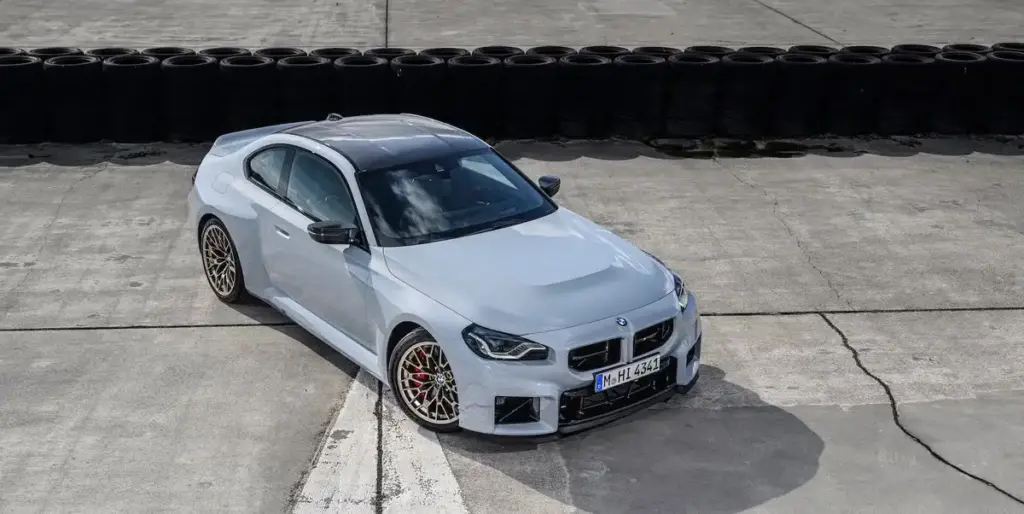
2026 BMW M2 Performance and Engine
Base M2 Powertrain Specifications
The S58 twin-turbocharged inline-six represents BMW’s latest evolution in performance six-cylinder engines, sharing architecture with M3 and M4 models[4].
Base M2 powertrain details:
- Engine code: S58 3.0L twin-turbo inline-six
- Power output: 473 horsepower @ 6,250 rpm
- Torque: 442 lb-ft (automatic) / 406 lb-ft (manual) @ 2,650-6,130 rpm
- 0-60 mph: 3.9 seconds (automatic), 4.1 seconds (manual)
- Quarter-mile: 12.2 seconds @ 116 mph (estimated)
- Top speed: 155 mph (electronically limited)
- Transmissions: 6-speed manual or 8-speed automatic
- Drivetrain: Rear-wheel drive with Active M Differential
The torque difference between transmissions reflects automatic gearbox’s ability to handle higher loads. Manual transmission purists accept slightly lower torque for rowing-your-own engagement that’s increasingly rare in performance cars[1][4].
M2 CS Enhanced Performance
The CS powertrain upgrades deliver legitimate performance gains beyond badge engineering[1][2].
CS performance specifications:
- Power: 523 horsepower @ 6,250 rpm (50 hp increase)
- Torque: 479 lb-ft @ 2,750-5,500 rpm (37 lb-ft gain)
- 0-60 mph: 3.7 seconds (estimated, potentially faster)
- 0-100 km/h: 3.8 seconds official (3.6 seconds in Sport Plus mode)
- Top speed: 188 mph (303 km/h) with M Driver’s Package
- Power-to-weight: Approximately 8.6 lbs/hp (vs. 9.2 lbs/hp base M2)
- Transmission: 8-speed M Steptronic automatic only
BMW achieved power gains through ECU recalibration, upgraded turbos, and enhanced cooling systems. The closed-deck S58 design handles increased boost pressures without durability concerns affecting earlier open-deck BMW turbo engines[4][5].
Real-World Driving Experience
The M2’s compact dimensions create driving dynamics distinct from larger M3/M4 models. At 179.4 inches long and 73.0 inches wide, the M2 delivers nimble handling that rewards driver skill[1].
Driving characteristics:
- Throttle response: Immediate power delivery with minimal turbo lag
- Handling balance: Rear-biased with controllable oversteer
- Steering feel: Precise with good on-center feel (electric assist)
- Daily usability: Compliant ride quality in Comfort mode
- Track capability: Repeatable performance with proper cooling
- Launch control: Consistent sub-4-second runs in automatic
The base M2 manual transmission offers purist appeal despite slightly slower acceleration. The three-pedal experience connects drivers to the mechanical act of driving in ways automatics cannot replicate, even with paddle shifters[1].
Fuel Economy and Range
Performance prioritization predictably impacts efficiency, though modern turbo technology provides reasonable fuel economy for a 473+ horsepower sports coupe[1].
| Specification | Base M2 | M2 CS |
|---|---|---|
| EPA city | 16 mpg | 16 mpg (est.) |
| EPA highway | 23 mpg | 23 mpg (est.) |
| EPA combined | 19 mpg | 19 mpg (est.) |
| Fuel type | Premium (91+ octane) | Premium required |
| Tank capacity | 13.5 gallons | 13.5 gallons |
| Range (combined) | ~257 miles | ~257 miles |
| Annual fuel cost | ~$2,900 (15K miles) | ~$2,900 (15K miles) |
Real-world highway driving often exceeds EPA estimates, with 25-27 mpg achievable during steady cruising. Aggressive driving and track use dramatically reduce efficiency, potentially dropping below 10 mpg under hard use. Premium fuel requirement adds approximately $0.50-$0.70 per gallon versus regular unleaded[1].
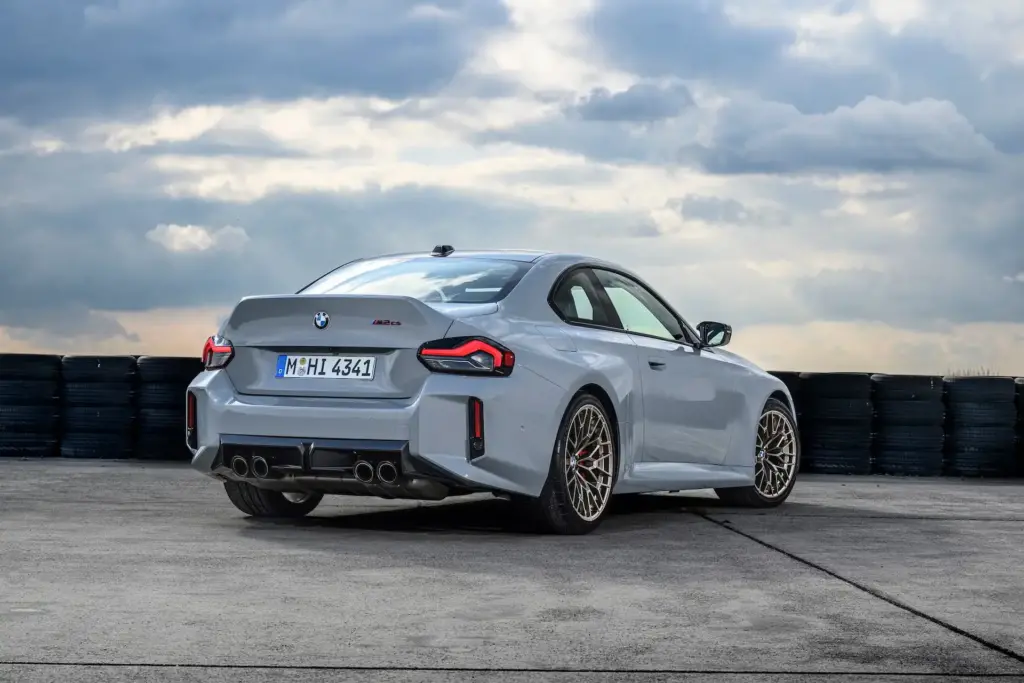
2026 BMW M2 Design and Styling
Exterior Design Philosophy
The G87 M2 generation maintains BMW M’s design language while avoiding the controversial vertical kidney grilles characterizing current M3/M4 models[1].
Design characteristics:
- Proportions: Classic coupe with long hood, short deck
- Fender flares: Muscular wheel arches housing wide tires
- Kidney grilles: Horizontal orientation respecting BMW heritage
- M-specific bumper: Aggressive front with large air intakes
- Quad exhausts: Signature M car rear styling element
The M2’s compact footprint (179.4″ L x 73.0″ W x 55.2″ H) creates visual presence exceeding its modest dimensions. Wide 275mm front and 285mm rear tires fill wheel arches, emphasizing performance capability[1].
M2 CS Exclusive Styling Elements
CS visual differentiation goes beyond badges, incorporating functional aerodynamic and weight-saving components[1][2].
CS unique features:
- Carbon fiber roof: Weight savings plus lowered center of gravity
- Ducktail spoiler: Integrated CFRP trunk lid with functional aero
- Front splitter: Matte black carbon fiber extending beyond bumper
- Mirror caps: Carbon fiber replacing body-color pieces
- Rear diffuser: CS-specific design with carbon fiber construction
- Ride height: 0.2 inches lower than base M2
- CS badging: Subtle exterior identification markers
The Velvet Blue Individual paint shown at launch events represents one of several CS-exclusive colors. Gold bronze-finished forged wheels contrast dramatically against blue paint, creating distinctive appearance[2].
Available Exterior Colors for 2026
BMW offers 14 paint options across the 2026 M2 lineup, including no-charge standards and premium Individual finishes[1].
Color availability:
- No-charge colors: Black Sapphire Metallic, Portimao Blue Metallic, Brooklyn Grey Metallic, Alpine White
- Metallic options: Toronto Red, Zandvoort Blue, Isle of Man Green (additional cost)
- BMW Individual: Velvet Blue (+$3,000), Tanzanite Blue, Fire Red, Frozen finishes
- CS exclusives: Certain Individual colors available only on CS variant
The previous F87 M2 CS saw Misano Blue as the most popular color (476 of 2,381 units), followed by Alpine White and Hockenheim Silver. Color choice significantly impacts resale value, with popular shades retaining value better than obscure options[3].
Wheel and Tire Options
Wheel selection impacts both aesthetics and performance through weight and tire sizing[1].
| Wheel Type | Base M2 | M2 CS |
|---|---|---|
| Standard wheels | 19″ M light alloy | 19″ forged aluminum |
| Front size | 19×9.0″ | 19×9.0″ |
| Rear size | 19×10.0″ | 19×10.0″ |
| Weight | ~27 lbs each | ~23 lbs each (forged) |
| Tire sizes | 275/35R19 F, 285/30R19 R | 275/35R19 F, 285/30R19 R |
| Brake option | M Sport brakes standard | M carbon ceramic ($8,500) |
Optional M carbon ceramic brakes provide fade-resistant performance during track use but carry substantial replacement costs ($12,000-$15,000 for complete rotor/pad service). Most street-driven M2s function adequately with standard steel brakes requiring only pad/rotor replacements every 30,000-50,000 miles[1].
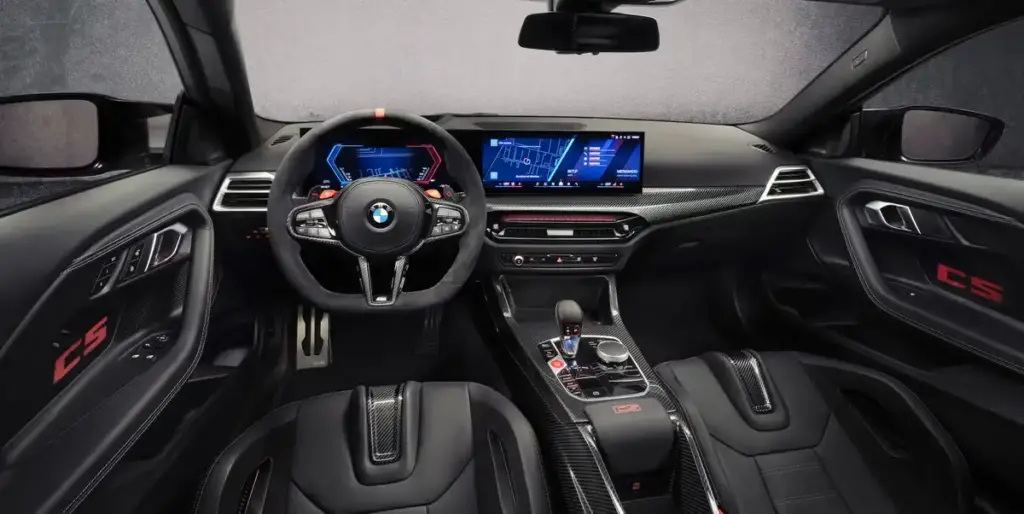
2026 BMW M2 Interior and Comfort
Cabin Design and Materials
The M2 interior balances performance focus with premium materials expected in $68,000-$99,000 coupes[1][2].
Interior highlights:
- M Sport seats: Standard with enhanced bolstering and integrated headrests
- M Carbon buckets: Optional on base ($2,500), standard on CS
- Steering wheel: Flat-bottom M leather with red center stripe
- Trim materials: Carbon fiber, brushed aluminum, Alcantara
- Quality level: Premium fit/finish consistent with BMW standards
The M2 CS takes weight reduction seriously by deleting the center armrest—a detail that seems minor but reflects hardcore track focus. The 2025 BMW i7 demonstrates BMW’s luxury capabilities; the M2 prioritizes performance over opulence[2].
Seating and Space
Compact coupe dimensions create trade-offs between sport and practicality[1].
Space specifications:
- Front headroom: 38.9 inches (adequate for 6’2″ drivers)
- Front legroom: 42.2 inches
- Rear headroom: 35.6 inches (tight for adults)
- Rear legroom: 30.9 inches (occasional use only)
- Trunk capacity: 15 cubic feet (reasonable for coupe)
- Split folding seats: 50/50 split rear seats increase cargo flexibility
The M Carbon bucket seats in the CS provide exceptional lateral support during aggressive cornering while maintaining reasonable comfort for highway cruising. These race-inspired seats weigh significantly less than standard M Sport seats while improving driver connection to vehicle dynamics[2].
Interior Color Schemes and Options
BMW offers three primary interior schemes with varying material combinations[1].
Interior options:
- Black: All-black leather with contrast stitching (standard)
- Black/Red: Black base with red accent stitching and highlights
- Black/M tricolor: Black with blue, purple, red M striping
- Alcantara: Steering wheel and shift boot material
- Carbon fiber: Interior trim package adding visual drama
The CS includes illuminated “CS” logos on the carbon bucket seats—subtle branding that glows when doors open. This attention to detail extends throughout the CS interior with exclusive carbon fiber trim pieces and red accent stitching[2].
Ergonomics and Driver Position
The M2’s driver-focused design prioritizes optimal seating position and control accessibility[1].
Ergonomic strengths:
- Seating position: Low, sporty with excellent pedal placement
- Visibility: Good outward sightlines for sports coupe
- Control layout: Intuitive placement of frequently-used functions
- Gauge cluster: M-specific displays with performance data
- Storage: Cup holders, door pockets, center console bin
The flat-bottom steering wheel provides thigh clearance during spirited driving while maintaining comfort during commuting. M1 and M2 buttons on the steering wheel allow instant access to driver-configured vehicle settings—essential for track use where switching between modes needs to happen quickly[1].
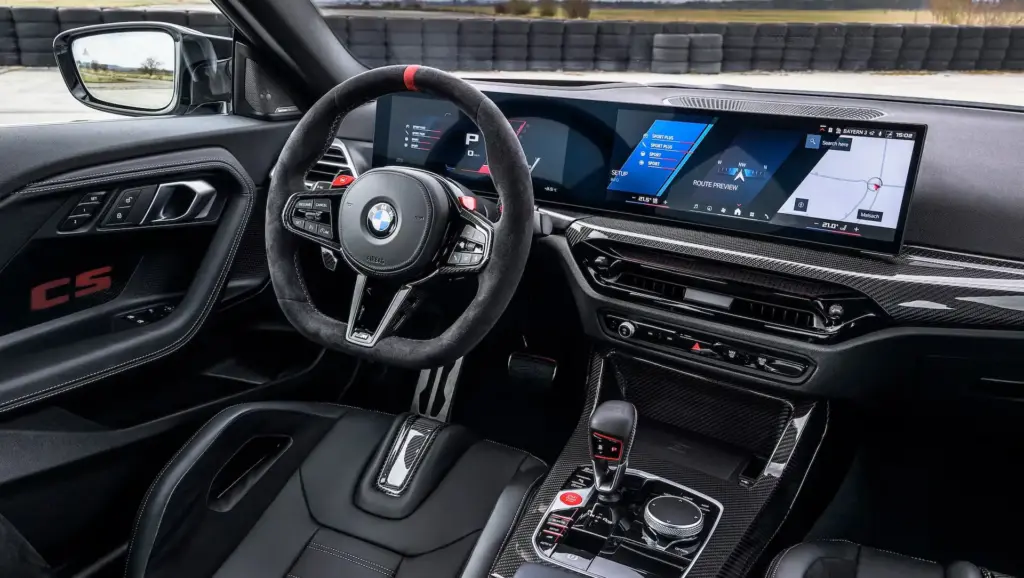
2026 BMW M2 Technology and Features
iDrive Infotainment System
The latest iDrive 8 system provides comprehensive connectivity and entertainment[1].
Technology features:
- Instrument cluster: 12.3-inch fully digital driver display
- Central screen: 14.9-inch curved touchscreen
- Operating system: iDrive 8 with improved processing speed
- Connectivity: Wireless Apple CarPlay and Android Auto
- Voice control: BMW Intelligent Personal Assistant
- Navigation: Real-time traffic with cloud-based routing
While iDrive 8 represents significant improvement over previous systems, some enthusiasts prefer iDrive 7’s physical controls for climate and volume. The touch-focused iDrive 8 requires adjustment, though voice control addresses many usability concerns while driving[1].
Driver Assistance and Safety Technology
Modern safety systems balance driver engagement with accident prevention[1].
Standard safety features:
- Active Driving Assistant: Lane departure warning, frontal collision warning
- Adaptive cruise: Stop-and-go capability in traffic
- Lane keeping: Active steering intervention
- Blind spot: Visual and haptic warnings
- Parking sensors: Front and rear obstacle detection
- Rearview camera: Standard rear visibility enhancement
Optional safety upgrades include surround-view camera system and automated parking assistance. While NHTSA and IIHS haven’t yet tested the 2026 M2 specifically, previous generation M2 models achieved strong safety ratings despite performance-focused nature[1].
Standard and Optional Technology Features
Equipment differentiation between base M2 and CS variants affects value assessment[1][2].
| Feature | Base M2 | M2 CS |
|---|---|---|
| Head-up display | Optional | Standard |
| Harman Kardon audio | Optional ($850) | Optional |
| Comfort Access | Optional | Optional |
| Remote start | Optional | Optional |
| Heated seats/wheel | Optional | Optional |
| Ambient lighting | Standard | Standard |
| Wireless charging | Standard | Standard |
The M2 CS includes head-up display standard—a $1,000 option on the base model. This projector displays critical information on the windshield, keeping driver attention focused forward rather than glancing at instruments during performance driving[2].
M-Specific Performance Technology
BMW M division technology enhances driver control and vehicle capability[1].
M performance systems:
- M Drive modes: Configurable Road, Sport, Track settings
- M buttons: Steering wheel shortcuts to saved configurations
- Launch control: Optimized start for maximum acceleration
- Active M Differential: Electronic limited-slip for rear axle
- M Dynamic Mode (MDM): Intermediate stability control level
- Performance data: Optional lap timer and telemetry recording
The M1 and M2 buttons allow drivers to save complete vehicle setups encompassing engine response, transmission shift points, steering weight, suspension stiffness, and stability control levels. One button press transforms the M2 from comfortable commuter to track weapon[1].
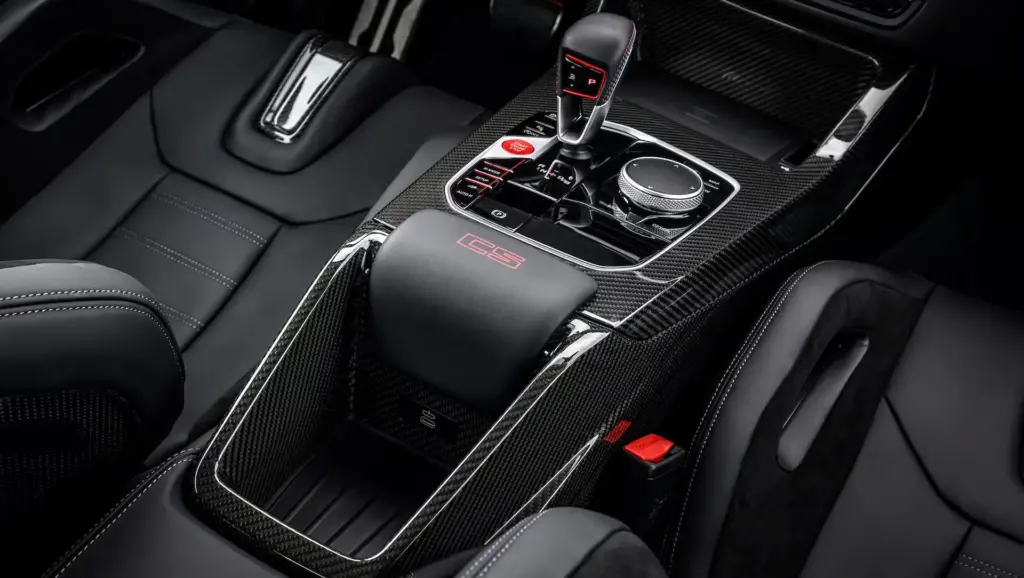
2026 BMW M2 Trim Levels and Packages
Base M2 Standard Equipment
The base M2 includes comprehensive equipment justifying its $68,200 starting price[1].
Standard base M2 features:
- Powertrain: 473 hp S58 engine, manual or automatic transmission
- Wheels/tires: 19-inch M wheels, performance summer tires
- Seats: M Sport seats with power adjustment
- Technology: iDrive 8, 14.9-inch display, wireless connectivity
- Lighting: LED headlights and taillights with adaptive function
- Braking: M Sport brakes with blue-painted calipers
- Differential: Active M limited-slip rear differential
The base M2 provides everything necessary for exceptional performance driving without requiring expensive option packages. Unlike some manufacturers that nickel-and-dime buyers, BMW includes core performance hardware standard[1].
M2 CS Exclusive Features
CS variants command premium pricing through exclusive performance hardware and luxury touches[1][2].
CS standard equipment:
- Engine: 523 hp upgraded S58 with enhanced cooling
- Transmission: 8-speed automatic only (no manual)
- Wheels: Forged 19-inch lightweight M wheels
- Seats: M Carbon bucket seats with illuminated CS logos
- Carbon components: Roof, hood, trunk, mirror caps, diffuser
- Aerodynamics: Unique ducktail spoiler, enhanced splitter
- Technology: Head-up display standard
- M Driver’s Package: Included (188 mph top speed)
- Suspension: CS-specific adaptive dampers
The CS package essentially bundles $15,000+ worth of individual options from the base M2 while adding exclusive components unavailable separately. However, the $30,400 premium still represents substantial investment for 50 additional horsepower and weight savings[1][2].
Available Packages and Options
Optional packages customize M2 variants to individual preferences[1].
Key option packages:
- Carbon Package ($9,900): M carbon roof, interior trim, bucket seats (base M2 only)
- M Driver’s Package: Raised 180 mph speed limiter (standard on CS)
- Lighting Package ($650): Adaptive LED with matrix capability
- Executive Package: Premium audio, advanced driver assistance
- Individual colors: BMW Individual paint finishes (+$2,000-$5,000)
- Track Package: Enhanced cooling, track-focused calibration
The Carbon Package on base M2 provides 80% of CS’s weight-saving carbon fiber for $9,900—significantly less than the CS premium. Budget-conscious buyers maximizing performance-per-dollar should consider this package[1].
Manual vs. Automatic Transmission Choice
Transmission selection represents philosophical decision beyond performance metrics[1].
Transmission comparison:
| Aspect | 6-Speed Manual | 8-Speed Automatic |
|---|---|---|
| Engagement | High (three-pedal) | Moderate (paddles) |
| Performance | 4.1 sec 0-60 | 3.9 sec 0-60 |
| Torque | 406 lb-ft | 442 lb-ft |
| Efficiency | Slightly better | Slightly worse |
| Track use | Requires skill | Optimized shifts |
| Resale value | Higher demand | Broader appeal |
| CS availability | Not available | Only option |
The manual transmission’s slower acceleration matters less than the emotional connection it provides. Rowing through gears creates active participation missing from automatics, even excellent units like BMW’s 8-speed. The M2 may be among the last opportunities to buy new manual M cars[1].
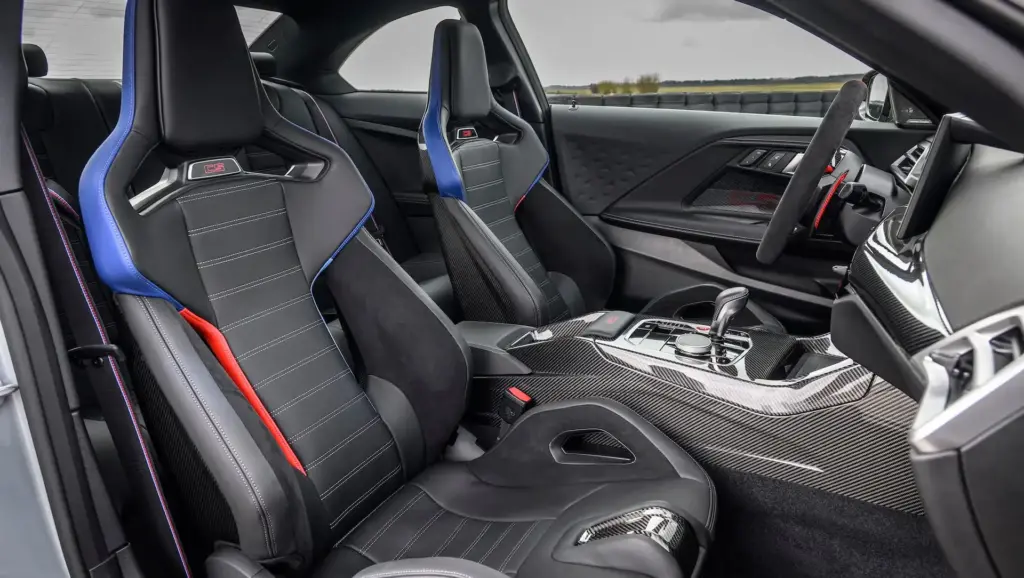
2026 BMW M2 Pricing and Value
MSRP and Pricing Structure
BMW’s 2026 M2 pricing positions both variants competitively within premium performance coupe segment[1].
2026 M2 pricing breakdown:
- Base M2 manual: $68,200 MSRP
- Base M2 automatic: $69,375 MSRP
- M2 CS automatic: $98,600 MSRP
- Destination charge: $1,095 (all models)
- Popular options: $5,000-$15,000 (base M2)
- Well-equipped base: $75,000-$85,000 (with options)
- CS as-tested: $105,000-$110,000 (with options)
Dealer markups represent concern for M2 CS given limited production. Early buyers may face $10,000-$20,000 above MSRP during initial allocation scarcity. Patient buyers waiting 6-12 months typically secure MSRP or modest discounts[1].
Pricing Comparison to Previous Years
The M2’s pricing trajectory reflects both content improvements and inflation impacts[1].
Historical M2 pricing:
- 2023 M2 (launch): $63,195 base MSRP
- 2025 M2: $65,500 base MSRP
- 2026 M2: $68,200 base MSRP (+$2,700 increase)
- Previous F87 M2 CS (2020): $83,600 MSRP
- Current G87 M2 CS (2026): $98,600 MSRP (+$15,000 increase)
The $15,000 CS price jump versus the 2020 model partially reflects general inflation (approximately 20% since 2020) but also indicates premium positioning. Inflation-adjusted pricing suggests the new CS carries modest real price premium over its predecessor[1].
Cost of Ownership Considerations
Total ownership costs extend beyond purchase price into insurance, maintenance, fuel, and depreciation[1].
Ownership cost estimates (annual, 15,000 miles):
- Insurance: $2,500-$4,000 (varies by age, location, driving record)
- Maintenance: $1,500-$2,500 (oil changes, inspections, wear items)
- Fuel: $2,900 (premium at $4.50/gallon, 19 mpg combined)
- Depreciation: ~$8,000-$12,000 annually (first 5 years)
- Total: $15,000-$21,000 annual ownership cost
Five-year depreciation averages 40.6% for M2 models, though CS variants may depreciate less due to limited production and collector appeal. The previous F87 M2 CS now trades above original MSRP in some cases—unusual for non-exotic performance cars[1][3].
Financing and Lease Options
Financial structuring impacts monthly payments and long-term value[1].
Estimated financing (September 2025):
- Interest rates: 5.5%-7.5% (excellent credit)
- 60-month loan: ~$1,300/month (base M2, 20% down)
- 36-month lease: ~$950/month (base M2, $5,000 down, 10K miles/year)
- CS lease: ~$1,400/month (similar terms, limited availability)
The M2 CS’s limited production makes leasing less attractive—dealers prefer selling limited-run models rather than keeping them in fleet inventory. Cash purchase or conventional financing allow immediate ownership and potential future appreciation[1].
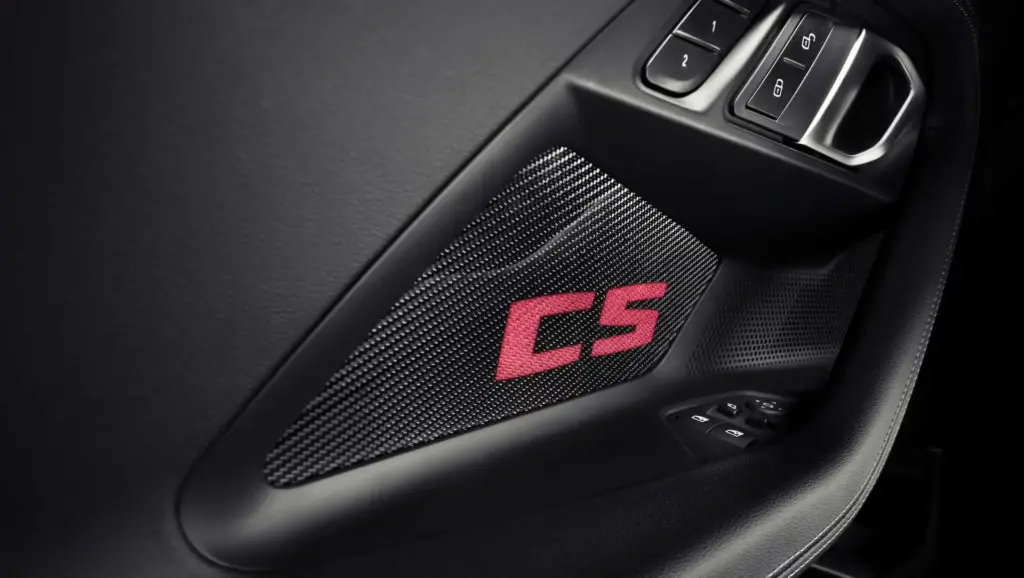
2026 BMW M2 vs. Key Competitors
BMW M2 vs. BMW M4 Competition
The intra-brand comparison helps buyers choose the right M car for individual needs[1][6].
| Specification | M2 | M4 Competition |
|---|---|---|
| Power | 473 hp | 503 hp |
| 0-60 mph | 3.9 sec | 3.4 sec |
| Price | $68,200 | $87,000+ |
| Wheelbase | 106.1″ | 112.8″ |
| Weight | ~3,800 lbs | ~4,000 lbs |
| Practicality | Compact coupe | Larger coupe/sedan |
| Manual option | Yes | No |
The M2 represents “right-sizing” for enthusiasts prioritizing agility over outright power. The M4’s additional $19,000 buys more performance and space but loses the M2’s nimble character. For buyers wanting the most compact M car with manual transmission, only the M2 qualifies[6].
BMW M2 vs. Porsche 718 Cayman
This cross-brand rivalry represents front-engine versus mid-engine layout philosophy[7][8].
Performance comparison:
- M2: 473 hp, $68,200, front-engine RWD, rear seats
- Cayman base: 300 hp, $72,800, mid-engine RWD, two-seater
- Cayman GTS: 400 hp, $90,300, mid-engine handling excellence
- Cayman GT4: 414 hp, $101,300, track-focused hardcore variant
The base Cayman costs $4,600 more than the M2 while delivering 173 fewer horsepower—positioning favoring BMW. However, the Cayman’s mid-engine layout provides inherently better weight distribution (45/55 vs. 51/49) creating sharper turn-in and balance. The M2 counters with more power, rear seats, and larger trunk[7][8].
BMW M2 CS vs. Porsche 718 Cayman GT4
The hardcore variant comparison better matches pricing and intent[1][7].
CS vs. GT4 battle:
- M2 CS: 523 hp, $98,600, automatic-only, limited production
- Cayman GT4: 414 hp, $101,300, manual or PDK, naturally aspirated flat-six
- Track focus: Both prioritize circuit performance over luxury
- Heritage: BMW M vs. Porsche motorsports lineage
- Sound: Turbo six vs. naturally aspirated flat-six character
The GT4’s manual transmission availability gives Porsche advantage for purists, while the M2 CS’s 109 additional horsepower favors BMW in straight-line acceleration. The GT4’s naturally aspirated 4.0L flat-six revs to 8,000 rpm with glorious sound; the M2 CS’s turbocharged engine delivers more power less dramatically[7].
BMW M2 vs. Toyota GR Supra
Platform-sharing creates interesting comparison between German and Japanese sports coupes[1].
Supra comparison points:
- Shared DNA: Both use BMW platforms and components
- M2: 473 hp, $68,200, manual available, BMW luxury
- Supra 3.0: 382 hp, $56,250, automatic-only, Toyota reliability
- Supra 3.0 Premium: Full equipment, $65,940
- Practicality: M2 offers rear seats, Supra is two-seater
The Supra delivers 85% of M2 performance for $8,000-$12,000 less while providing Toyota’s legendary reliability. The M2 justifies its premium through more power, manual transmission availability, and rear seats. Both share B58/S58 engine family roots, though the M2’s S58 receives more performance-focused engineering[1].
BMW M2 vs. Chevrolet Corvette C8
American versus German performance philosophies clash at identical starting prices[1].
Corvette comparison:
- Price parity: Both start around $68,000
- M2: 473 hp, front-engine, practical daily driver, rear seats
- Corvette: 495 hp, mid-engine, exotic presence, minimal storage
- Layout: Traditional vs. supercar configuration
- Attention factor: Corvette draws more public interest
The Corvette’s mid-engine layout and dramatic styling create supercar experience at mainstream pricing. The M2 prioritizes daily usability with comfortable ride, rear seats, and larger trunk. Track capability largely matches despite different approaches—the M2 via balanced handling, the Corvette through mid-engine physics[1].
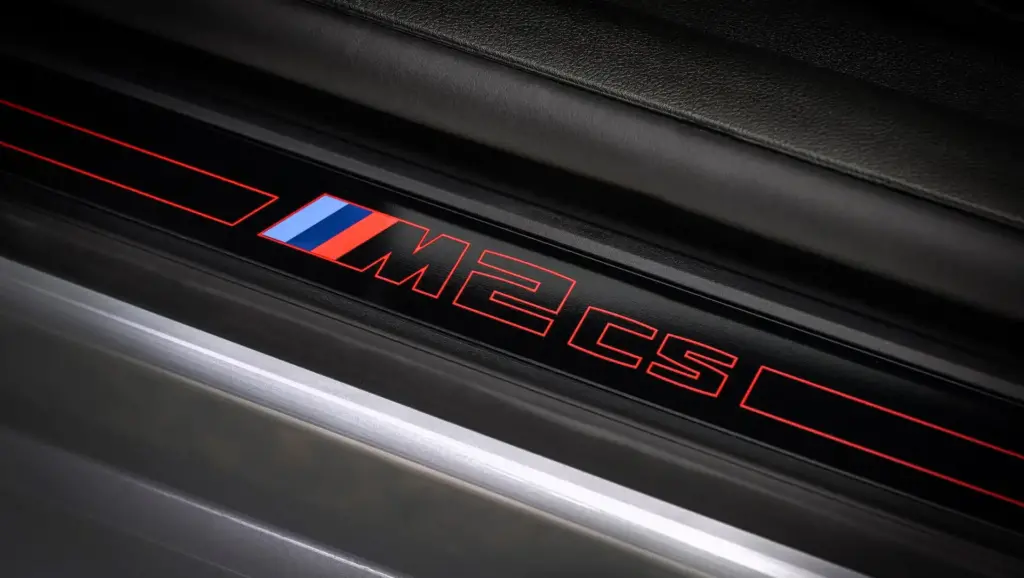
2026 BMW M2 Reliability and Common Issues
Known M2 Platform Issues
The S58 engine represents significant reliability improvement over previous BMW M engines, though no powerplant is problem-free[4][5].
S58 reliability observations:
- Overall dependability: Significantly better than N54/N55/S55 predecessors
- Common concerns: Oil filter housing leaks, coolant system components
- Electrical issues: Occasional infotainment glitches, sensor faults
- Taillight malfunctions: Known issue with rear light assemblies
- Turbocharger: Wastegate rattle reported in some units
The closed-deck S58 design provides structural strength supporting high boost pressures without the head gasket failures plaguing earlier open-deck BMW turbo engines. Regular maintenance and proper warm-up/cool-down procedures dramatically extend engine life[4][5].
Maintenance Requirements and Costs
High-performance engines demand more frequent and expensive service than economy cars[1].
Maintenance schedule and costs:
- Oil changes: Every 10,000 miles or annually, $150-$250
- Brake fluid: Every 2 years, $150-$200
- Coolant: Every 4 years or 50,000 miles, $200-$300
- Spark plugs: Every 60,000 miles, $400-$600
- Differential fluid: Every 50,000 miles, $200-$300
- Major service (60K): $2,000-$3,000 including multiple systems
Annual maintenance costs average $1,500-$2,500 for normal driving. Track use accelerates brake pad, tire, and fluid consumption, potentially doubling maintenance expenses. The upcoming BMW iM3 electric M3 will eliminate oil changes and reduce brake wear through regenerative braking—advantages of electric powertrains[1].
Warranty Coverage and Protection Plans
BMW’s warranty provides reasonable coverage though shorter than some competitors[1].
Warranty details:
- Basic warranty: 4 years / 50,000 miles (bumper-to-bumper)
- Powertrain: 4 years / 50,000 miles (engine, transmission, drivetrain)
- Corrosion: 12 years / unlimited miles (perforation only)
- Roadside assistance: 4 years / unlimited miles
- No maintenance: BMW eliminated complimentary scheduled maintenance
Extended warranty options cost $2,000-$4,000 and provide coverage beyond the factory warranty period. Given BMW’s higher-than-average repair costs, extended warranties offer peace of mind though may not represent best value for careful owners[1].
Long-Term Ownership Considerations
Five-year ownership reveals costs beyond regular maintenance[1].
Long-term concerns:
- Suspension wear: Control arm bushings, end links require replacement 60K-80K miles
- Steering system: Electronic power steering generally reliable
- Carbon ceramic brakes: $12,000-$15,000 replacement if equipped
- Software updates: Regular dealer visits for latest calibrations
- Parts availability: M2 CS limited production may complicate parts sourcing
The S58 engine’s forged internals and low compression ratio (9.3:1) support long service life even under performance driving. Proper maintenance and avoiding extended track sessions without adequate cooling prevent the majority of potential problems[4][5].
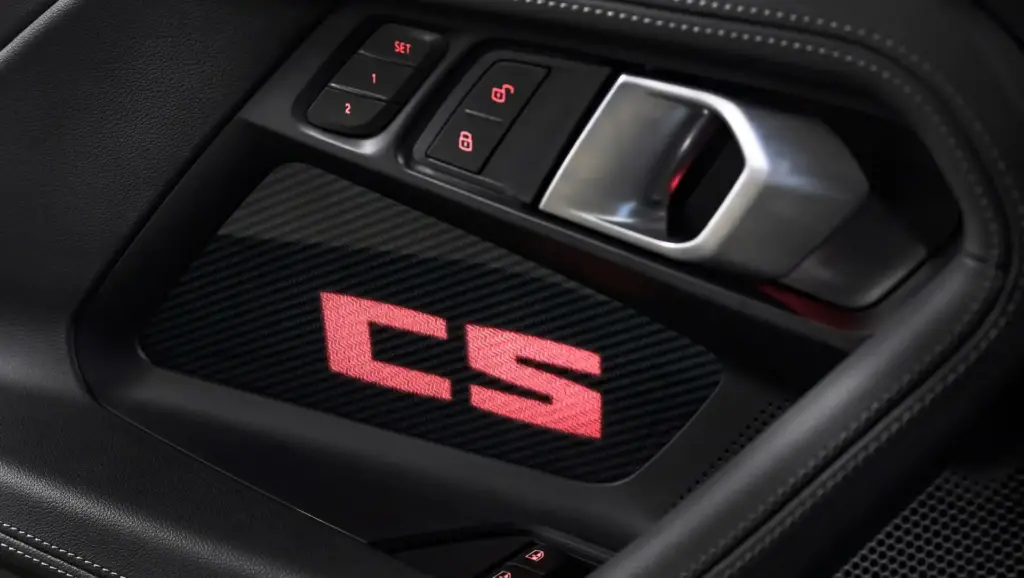
Should You Buy the 2026 BMW M2?
Who Should Buy the Base M2
The base M2 represents sweet spot for enthusiasts balancing performance, practicality, and value[1].
Ideal base M2 buyers:
- Manual enthusiasts: Last chance for new M2 with three pedals
- Daily driver needs: Requiring comfortable commuter with weekend performance
- Value focus: Maximizing performance per dollar spent
- Track participants: Occasional track day use with street priorities
- Practical concerns: Needing rear seats and reasonable trunk space
At $68,200, the base M2 delivers 473 horsepower in compact, rear-drive package with manual transmission—a combination increasingly rare. Budget-conscious buyers should opt for manual transmission to maximize driving engagement despite slightly slower acceleration[1].
Who Should Consider the M2 CS
The CS variant targets specific buyer segment willing to pay substantial premium for ultimate M2 performance[1][2].
CS ideal buyers:
- Track enthusiasts: Prioritizing circuit performance above all else
- Collectors: Seeking limited-production BMW M vehicles
- Performance purists: Willing to sacrifice manual for optimal performance
- Early adopters: Accepting premium pricing for exclusivity
- Investment potential: Betting on future collectibility and appreciation
The CS’s $98,600 pricing positions it against Porsche Cayman GT4 and other hardcore sports cars. Buyers must value the 50 additional horsepower, 100-pound weight savings, and exclusive CS components at $30,400 premium. For those planning extensive track use, the CS justifies its cost through superior cooling, suspension tuning, and carbon fiber construction[1][2].
Who Should Look at Alternatives
The M2 isn’t ideal for all buyers despite exceptional performance[1].
Consider alternatives if:
- Space requirements: Needing adult rear passenger accommodation regularly
- Fuel economy: Prioritizing efficiency over performance
- Exotic experience: Wanting mid-engine layout and supercar drama
- Budget limits: Maximum $60,000 purchase price
- All-weather capability: Requiring all-wheel drive for winter conditions
Buyers prioritizing fuel economy should avoid the M2 entirely—19 mpg combined and premium fuel requirements create substantial operating costs. Those needing reliable winter transportation should wait for rumored 2027 M2 xDrive offering all-wheel drive traction[1].
Best Time to Buy and Negotiation Tips
Strategic timing and negotiation maximize value when purchasing performance cars[1].
Buying strategy:
- Base M2 availability: Good dealer stock, modest negotiation leverage
- M2 CS scarcity: Limited allocation, expect MSRP or markups initially
- Seasonal timing: September-November end-of-year discounts possible
- Model year timing: 2027 M2 launch may improve 2026 negotiation
- Trade-in strategy: Separate trade-in from purchase negotiations
The base M2’s healthy production allows $500-$1,500 discounts at motivated dealers, though BMW’s strong brand rarely sees deep discounting. The M2 CS’s limited production eliminates most negotiation leverage—early buyers pay MSRP or above, patient buyers may find discounts 12-18 months post-launch as initial demand subsides[1].
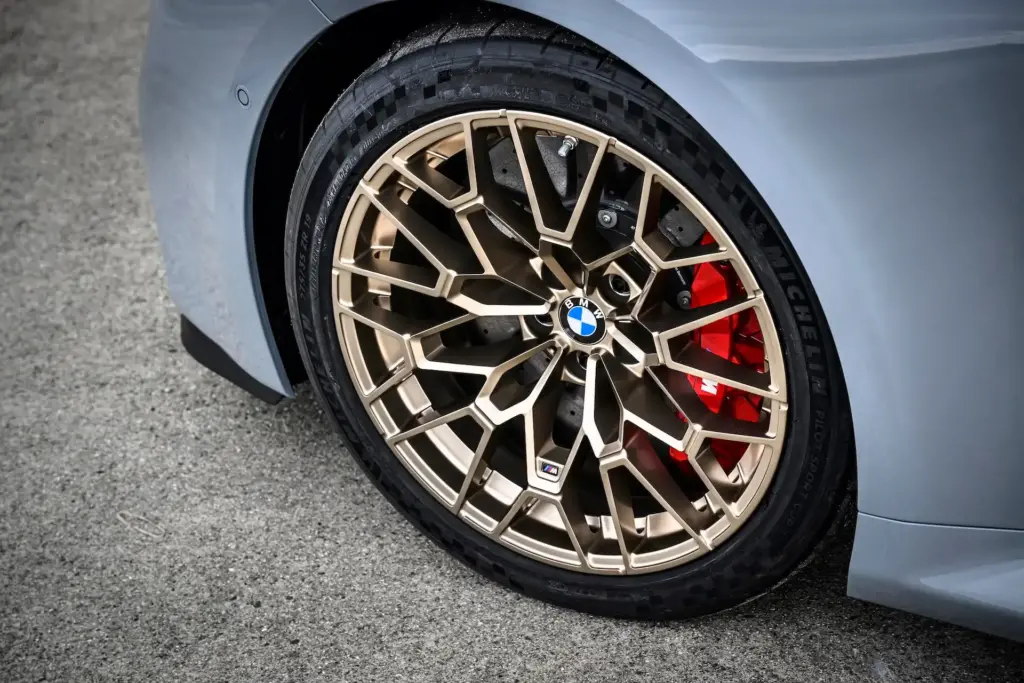
Key Takeaways
- The 2026 M2 CS debuts with 523 hp and 100 lbs weight savings for $98,600, while base M2 continues at $68,200.
- Manual transmission remains available on base M2 only; CS is automatic-only with no manual option offered.
- Limited production (under 2,000 annually) makes M2 CS rare; expect dealer markups early, MSRP pricing later.
- The S58 engine proves reliable with proper maintenance; expect $1,500-$2,500 annual service costs for normal use.
- Base M2 delivers 90% of CS performance for $30,400 less; CS justifies premium only for hardcore track enthusiasts.
- Compared to Porsche Cayman, M2 offers more power and practicality; Cayman provides mid-engine handling purity.
- Strong resale values and potential CS appreciation make M2 smart investment for enthusiast collectors.
FAQs
What is the difference between the 2026 BMW M2 and M2 CS?
Is the BMW M2 CS worth the $30,000 premium over the base M2?
For track enthusiasts prioritizing ultimate performance and limited production exclusivity, yes. For street-focused drivers, the base M2 delivers 90% of the experience at significantly lower cost. Consider if weight savings and bragging rights justify the premium[1].
Does the 2026 BMW M2 come with a manual transmission?
Yes, the base M2 offers a 6-speed manual transmission producing 406 lb-ft torque, alongside an 8-speed automatic option (442 lb-ft). The M2 CS is automatic-only with no manual availability[1].
How reliable is the BMW M2 long-term?
What is the 0-60 time for the 2026 BMW M2 CS?
How many 2026 BMW M2 CS will be produced?
Can you daily drive a BMW M2?
Yes, the M2 functions well as a daily driver with comfortable ride quality in standard mode, reasonable fuel economy for performance car, adequate trunk space, and optional rear seats. The manual transmission adds engagement to commuting[1].
What are the most common problems with the BMW M2?
How does the BMW M2 compare to the Porsche 718 Cayman?
Is the BMW M2 better than the M4?
The M2 offers nimbler handling, manual transmission, and $19,000 lower price. The M4 provides more power, space, and prestige. The M2 represents “right-sizing” for enthusiasts prioritizing agility; the M4 suits buyers wanting maximum performance and presence[6].
References
- Car and Driver. (2025). 2026 BMW M2 Review, Pricing, and Specs. https://www.caranddriver.com/bmw/m2-2026
- BMW Press Group. (2025). The new 2026 BMW M2 CS. https://www.press.bmwgroup.com/usa/article/detail/T0450429EN_US/the-new-2026-bmw-m2-cs
- BMW Blog. (2025). BMW M2 CS Production Numbers Revealed: Colors, Transmissions, Brakes. https://www.bmwblog.com/2025/07/19/bmw-m2-cs-production-numbers-colors-transmissions-brakes/
- BMW Blog. (2024). BMW S58: Reliability, Efficiency and Tuning. https://www.bmwblog.com/2024/04/29/bmw-s58-reliability-efficiency-and-tuning/
- BMW Tuning. (2024). BMW S55 vs S58: Performance, Reliability & Tuning. https://bmwtuning.co/s55-vs-s58/
- BMW Blog. (2024). BMW M2 vs. M3 vs. M4: Which is Right for You? https://www.bmwblog.com/2024/12/23/bmw-m2-vs-m3-vs-m4-which-to-choose/
- Fastest Laps. (2025). BMW M2 vs Porsche 718 Cayman. https://fastestlaps.com/comparisons/p23vv7aigath
- What Car. (2024). New BMW M2 vs Porsche Cayman GTS. https://www.whatcar.com/news/new-bmw-m2-vs-porsche-718-cayman/n26545

I am a senior automotive analyst at Autvex. Expert vehicle evaluations, in-depth reviews, and objective analysis helping readers make informed automotive decisions with years of industry experience.




